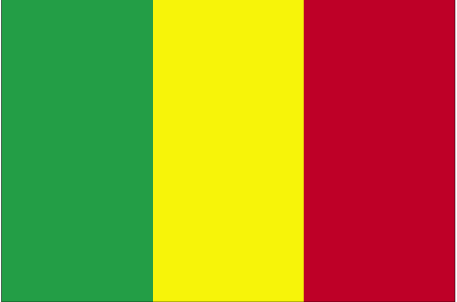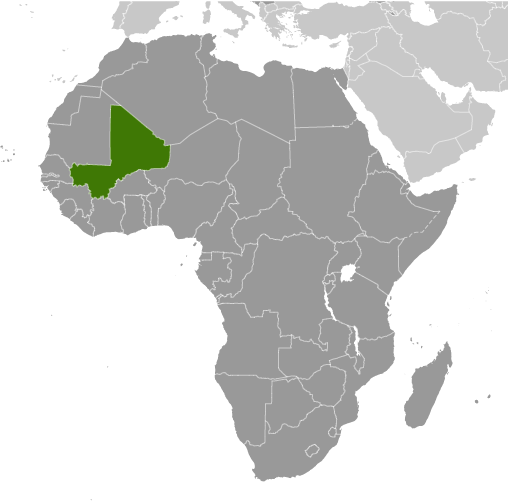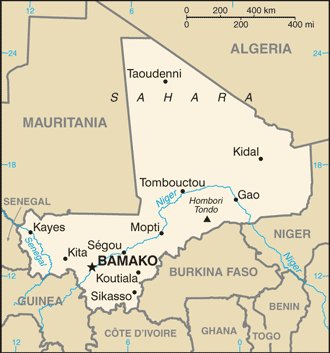The Sudanese Republic and Senegal became independent of France in 1960 as the Mali Federation. When Senegal withdrew after only a few months, what formerly made up the Sudanese Republic was renamed Mali. Rule by dictatorship was brought to a close in 1991 by a military coup - led by the current president Amadou TOURE - enabling Mali's emergence as one of the strongest democracies on the continent. President Alpha KONARE won Mali's first democratic presidential election in 1992 and was reelected in 1997. In keeping with Mali's two-term constitutional limit, KONARE stepped down in 2002 and was succeeded by Amadou TOURE, who was subsequently elected to a second term in 2007. The elections were widely judged to be free and fair.
Locaion
Western Africa, southwest of Algeria
Geographic Co ordinates
17 00 N, 4 00 W
Land Boundries
Total:7,243 km
Border countries: Algeria 1,376 km, Burkina Faso 1,000 km, Guinea 858 km, Cote d'Ivoire 532 km, Mauritania 2,237 km, Niger 821 km, Senegal 419 km
Geography - note
landlocked; divided into three natural zones: the southern, cultivated Sudanese; the central, semiarid Sahelian; and the northern, arid Saharan
Population
13,796,354 (July 2010 est.)
Country comparison to the world:68
Nationality
Noun:Malian(s)
Adjective:Malian
Ethnic groups
Mande 50% (Bambara, Malinke, Soninke), Peul 17%, Voltaic 12%, Songhai 6%, Tuareg and Moor 10%, other 5%
Religions
Muslim 90%, Christian 1%, indigenous beliefs 9%
Languages
French (official), Bambara 80%, numerous African languages
Country Name
Conventional long form:Republic of Mali
Conventional short form:Mali
Local long form:Republique de Mali
Local short form:Mali
Former: French Sudan and Sudanese Republic
Government Type
republic
Capital
Name:Bamako
Geographic coordinates:12 39 N, 8 00 W
Time difference:UTC 0 (5 hours ahead of Washington, DC during Standard Time)
Administrative divisions
8 regions (regions, singular - region); Gao, Kayes, Kidal, Koulikoro, Mopti, Segou, Sikasso, Tombouctou
Independence
22 September 1960 (from France)
National Holiday
Independence Day, 22 September (1960)
Constitution
adopted 12 January 1992
Legal system
based on French civil law system and customary law; judicial review of legislative acts in Constitutional Court; has not accepted compulsory ICJ jurisdiction
Suffrage
18 years of age; universal
Executive branch
Chief of state:President Amadou Toumani TOURE (since 8 June 2002)
Head of government: Prime Minister Modibo SIDIBE (since 28 September 2007)
Cabinet:Council of Ministers appointed by the prime minister
(For more information visit the World Leaders website)
Elections:president elected by popular vote for a five-year term (eligible for a second term); election last held on 29 April 2007 (next to be held in April 2012); prime minister appointed by the president
Election results:Amadou Toumani TOURE reelected president; percent of vote - Amadou Toumani TOURE 71.2%, Ibrahim Boubacar KEITA 19.2%, other 9.6%
Legislative branch
unicameral National Assembly or Assemblee Nationale (147 seats; members elected by popular vote to serve five-year terms)
Elections:last held on 1 and 22 July 2007 (next to be held in July 2012)
Election results:percent of vote by party - NA; seats by party - ADP coalition 113 (ADEMA 51, URD 34, MPR 8, CNID 7, UDD 3, and other 10), FDR coalition 15 (RPM 11, PARENA 4), SADI 4, independent 15
Judicial branch
Supreme Court or Cour Supreme
Political Parties and Leaders
African Solidarity for Democracy and Independence or SADI [Oumar MARIKO, secretary general]; Alliance for Democracy or ADEMA [Diounconda TRAORE]; Alliance for Democracy and Progress or ADP (a coalition of political parties including ADEMA and URD formed in December 2006 to support the presidential candidacy of Amadou TOURE); Alliance for Democratic Change (political group comprised mainly of Tuareg from Mali's northern region); Convergence 2007 [Soumeylou Boubeye MAIGA]; Front for Democracy and the Republic or FDR (a coalition of political parties including RPM and PARENA formed to oppose the presidential candidacy of Amadou TOURE); National Congress for Democratic Initiative or CNID [Mountaga TALL]; Party for Democracy and Progress or PDP [Mady KONATE]; Party for National Renewal or PARENA [Tiebile DRAME]; Patriotic Movement for Renewal or MPR [Choguel MAIGA]; Rally for Democracy and Labor or RDT [Amadou Ali NIANGADOU]; Rally for Mali or RPM [Ibrahim Boubacar KEITA]; Sudanese Union/African Democratic Rally or US/RDA [Mamadou Basir GOLOGO]; Union for Democracy and Development or UDD [Moussa Balla COULIBALY]; Union for Republic and Democracy or URD [Soumaila CISSE]
Political pressure groups and leaders
Other: the army; Islamic authorities; rebels in the northern region; state-run cotton company CMDT; tuaregs
International organization participation
ACP, AfDB, AU, CD, ECOWAS, FAO, FZ, G-77, IAEA, IBRD, ICAO, ICCt, ICRM, IDA, IDB, IFAD, IFC, IFRCS, ILO, IMF, Interpol, IOC, IOM, IPU, ITSO, ITU, ITUC, MIGA, MONUC, NAM, OIC, OIF, OPCW, UN, UNAMID, UNCTAD, UNESCO, UNIDO, UNMIL, UNMIS, UNWTO, UPU, WADB (regional), WAEMU, WCO, WFTU, WHO, WIPO, WMO, WTO
Diplomatic representation in the US
Chief of mission:Ambassador Mamadou TRAORE
Chancery:2130 R Street NW, Washington, DC 20008
Telephone: [1] (202) 332-2249, 939-8950
FAX:[1] (202) 332-6603
Diplomatic representation from the US
Chief of mission:Ambassador Gillian A. MILOVANOVIC
Embassy:located just off the Roi Bin Fahad Aziz Bridge just west of the Bamako central district
Mailing address: ACI 2000, Rue 243, Porte 297, Bamako
Telephone:[223] 270-2300
FAX:[223] 270-2479
Flag description
three equal vertical bands of green (hoist side), yellow, and red
note: uses the popular Pan-African colors of Ethiopia










